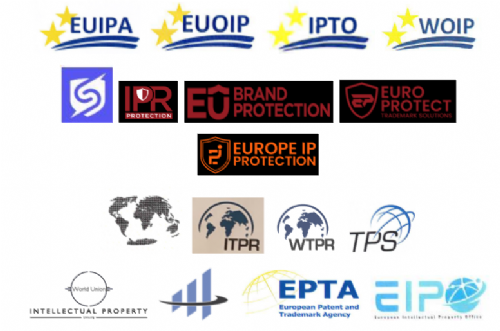Now in its twelfth year, Class 46 is dedicated to European trade mark law and practice. This weblog is written by a team of enthusiasts who want to spread the word and share their thoughts with others.
Click here subscribe for free.
Who we all are...
Revised rules of procedure for BoA
The revised Rules of Procedure of the EUIPO Boards of Appeal entered into force on 1 June 2025.
The Rules have been updated to reflect the changes that came into effect in the first phase of the Design Legal Reform on 1 May 2025.
Article 23
Article 23 of the Rules of Procedure concerning written observations by interested parties in proceedings before the Grand Board has also been amended to make it easier for interested groups or bodies to submit written observations in Grand Board cases.
Following the amendment of Article 23 of the Rules of Procedure, written observations can now be submitted in any of the official languages of the EU.
Where these are submitted in a language of the Office, which is not the language of the proceedings, the Grand Board will provide a translation into the language of the proceedings upon a reasoned request by the parties within one month.
Where the written observations are submitted in an official language of the EU which is neither the language of the proceedings nor a language of the Office, the Registrar shall invite the interested groups or bodies to submit a translation into the language of the proceedings within one month.
The revised Rules of Procedure are available online in English and will be translated into the other four Office working languages of EUIPO. For ease of reference, a version with changes highlighted has also been published.
If you have any questions, please contact a member of the MARQUES European Trade Mark Law and Practice Team.
Posted by: Blog Administrator @ 12.35Tags: Boards of Appeal, EUIPO, Article 23,


 Sharing on Social Media? Use the link below...
Sharing on Social Media? Use the link below...Perm-A-Link: https://www.marques.org/blogs/class46?XID=BHA5359
EUIPO mediation services extended
 From today (2 June), parties involved in any inter partes proceedings before EUIPO can request mediation to solve their dispute.
From today (2 June), parties involved in any inter partes proceedings before EUIPO can request mediation to solve their dispute.
The EUIPO Mediation Centre offers services including mediation and conciliation which are voluntary, free of charge and can be carried out securely online.
The Centre was launched in November 2023. As of today, it can handle first or second instance EUTM opposition and cancellation proceedings and EUD invalidity proceedings.
While pending disputes must concern EUTMs and/or registered EUDs, ADR also allows the inclusion of parallel conflicts involving the same parties and other IP rights or other disputes.
Under the Office’s Strategic Plan 2030, new ADR services will be explored, potentially including mediation for GIs for craft and industrial products and copyright.
A Mediation Stakeholders Network has also been set up to bring together stakeholders from IP user associations and other groups.
EUIPO is hosting the fifth IP Mediation Conference on 16-17 October 2025 in Malta.
Find out more on EUIPO’s website here. Photo of EUIPO taken from the Office's website.
Posted by: Blog Administrator @ 12.18Tags: Mediation, EUIPO, EUTM, EUD,


 Sharing on Social Media? Use the link below...
Sharing on Social Media? Use the link below...Perm-A-Link: https://www.marques.org/blogs/class46?XID=BHA5358
New Boards of Appeal case law reports
Class 46 readers may be interested to know that three new EUIPO Boards of Appeal case-law reports have been published:
- Descriptiveness of names of colours
- Similarity between pharmaceuticals and cosmetics
- Component parts of complex products (Article 4(2) and (3) EUDR)
The reports are used by the Boards to identify case-law trends, develop a common understanding of relevant legal issues and support consistency. They are also used by EUIPO as a basis for discussion of Common Practices with IP Offices and User Associations to harmonise practices and standards.
More information is available on the Boards of Appeal case-law research reports page on the EUIPO website. Ideas for future topics for reports or other feedback can be sent to the Boards using the following email address: BoACooperation@euipo.europa.eu.
Posted by: Blog Administrator @ 17.29Tags: EUIPO, Boards of Appeal, descriptiveness,


 Sharing on Social Media? Use the link below...
Sharing on Social Media? Use the link below...Perm-A-Link: https://www.marques.org/blogs/class46?XID=BHA5357
WIPO launches eMadrid (beta)
WIPO has unveiled a new version of eMadrid, which is now available in a beta environment.
New features include: Centralized hub; Integrated workbench; Collaboration features; Real-time updates and prompts; and Built-in guidance.
eMadrid (beta) is a live environment, with real trade mark data, and is running in parallel with current eMadrid webpages. It can be used for all Madrid System transactions via a WIPO account.
Users should use the English version for the best experience, as the French and Spanish versions are not yet fully translated.
eMadrid (beta) was launched on 20 May, during the INTA Annual Meeting in San Diego, California.
More information about the new features, as well as how to provide feedback, can be found on WIPO’s website here.
WIPO is also hosting two webinars, both in English, which will provide a guide to eMadrid (beta). They are on 28 May at 9.00 Geneva time and 3 June at 16.30 Geneva time. Further webinars will be announced soon.
Posted by: Blog Administrator @ 17.26Tags: eMadrid, WIPO, Madrid System,


 Sharing on Social Media? Use the link below...
Sharing on Social Media? Use the link below...Perm-A-Link: https://www.marques.org/blogs/class46?XID=BHA5356
CIPO-initiated cancellation proceedings in Canada
 On 1 January 2025, the Canadian Intellectual Property Office (CIPO) launched a pilot project that allows it to unilaterally start non-use cancellation proceedings against trade mark registrations that are more than three years old. The project aims to clear the register of trade marks that are unlikely to be used in Canada. Sanjukta Tole provides a report for Class 46.
On 1 January 2025, the Canadian Intellectual Property Office (CIPO) launched a pilot project that allows it to unilaterally start non-use cancellation proceedings against trade mark registrations that are more than three years old. The project aims to clear the register of trade marks that are unlikely to be used in Canada. Sanjukta Tole provides a report for Class 46.
CIPO is targeting older registrations based on use in Canada or where Declarations of Use were filed. Any registrations less than three years old or any new extensions of older registration that have issued for less than three years will not be subject to this pilot project.
Evidence of use
Once CIPO issues a notice of cancellation against a registration, the registrant must provide affidavit evidence of use of the mark with each of the goods and/or services in the registration that are the subject of the notice.
It is critical that foreign brand owners have agents appointed to their registrations in Canada as CIPO will not typically communicate with registrants that have foreign addresses.
The affidavit evidence must be filed within three months of receiving the notice with one two-month extension of time as of right. The relevant period for use is three years prior to the date the proceeding is commenced by CIPO. There is no cross-examination on the evidence.
Proceedings
CIPO will discontinue the proceeding if (a) a registrant demonstrates the use of the mark with all the goods and/or services or (b) demonstrates use with some of the goods/services and deletes the ones not in use either voluntarily or following notice from CIPO identifying goods/services not in use.
If a registrant disagrees with CIPO’s findings, it can file written arguments and/or attend a hearing.
If a registrant is seeking to maintain a registration despite non-use due to special circumstances, the proceeding cannot be discontinued. Instead, a decision will be issued by CIPO on the acceptability of the excuse for non-use.
Any decision rendered by CIPO in the proceeding may be appealed to the Federal Court of Canada.
Advice for brand owners
When reviewing use of the mark in Canada, brand owners should keep in mind that the definition of use has a specific statutory definition in the Trademarks Act, R.S.C. 1985, c. T-13, particularly with goods.
The mark must be brought to the customer’s attention when the registered goods are transferred to the customer in the normal course of trade. The best evidence is having the mark appear on the goods, on labels or other materials attached to the goods and on product packaging.
Ancillary materials such as point-of-purchase materials or invoices can demonstrate use if they provide notice of the mark to the customer when the goods are transferred. The use of a mark on a website alone, for example, would not necessarily work by itself for goods but it may demonstrate use with services, which is easier to prove.
Brand owners need to remember that it is imperative to retain updated samples of use every few years and maintain sales figures and licensing documents in three-year windows for the purposes of this proceeding, although an ongoing archive of use is the best approach to counter such proceedings.
To protect against possible non-use proceedings from CIPO, brand owners with long standing registrations in Canada should review their portfolios to ensure that they have used their marks in Canada with at least some of the goods and services in the registration that are core to the business so that registrations, if selected by CIPO, can be sustained.
Thought should also be given to whether additional applications need to be filed in Canada to cover any new products and services that may now be associated with such trade marks or where the marks themselves have changed.
With examination wait times falling swiftly, it is a good time to consider revisiting portfolios in Canada.
Sanjukta S Tole is a Partner of Dickinson Wright in Toronto and a member of the MARQUES International Trade Mark Law and Practice Team
Posted by: Blog Administrator @ 03.09Tags: CIPO, cancellation, Canada,


 Sharing on Social Media? Use the link below...
Sharing on Social Media? Use the link below...Perm-A-Link: https://www.marques.org/blogs/class46?XID=BHA5355
Europol and EUIPO publish report on misleading invoices
 Europol recently released its 2024 situation report “Misleading payment request fraud targeting intellectual property rights owners”
Europol recently released its 2024 situation report “Misleading payment request fraud targeting intellectual property rights owners”
The report, which is an update of previous research, highlights scammers’ evolving tactics and trends.
It shows a significant increase in fraudulent activities targeting IP rights holders and applicants, such as email spoofing and phishing attacks, impersonation of IP offices and use of EUIPO’s online database and national IP office registers.
The report estimates that the average fee requested by fraudsters is €1,500 and this results in estimated yearly profits of over €26 million. It adds that the use of digitalization and AI tools has made it easier for scammers to exploit technology and support criminal activity.
EUIPO states: “The EUIPO is committed to protecting IP rightsholders and applicants across the EU and bringing those responsible to justice, working closely with Europol, other law enforcement agencies and the Anti-Scam network to combat this type of fraud.” It coordinates the Anti-Scam Network, of which MARQUES is a member.
EUIPO urges all IP right applicants and owners to be cautious when receiving payment requests and to verify the authenticity of the communication before taking any action. If a payment request includes a bank account that is different from the two EUIPO bank accounts held in Spain (Caixa Bank ES03 2100 2353 0107 0000 0888 and Santander ES08 0049 6659 0121 1622 4792), it does not originate from the EUIPO.
More information is available on the EUIPO website here. The full report is published on Europol’s website here.
MARQUES is firmly committed to fighting scammers who target IP rights owners and the MARQUES Anti-Fraud Task Force has developed a portal to collect reports from MARQUES members about paid or unpaid invoices, which is now fully operational.
More information about the portal, which can be accessed by MARQUES members here, will be published in the May issue of the HouseMARQUES newsletter.
The image shows logos used by companies suspected to be involved in the misleading invoice and payment request fraud and is taken from the Europol report
Posted by: Blog Administrator @ 00.25Tags: Europol, misleading invoices, anti-scam,


 Sharing on Social Media? Use the link below...
Sharing on Social Media? Use the link below...Perm-A-Link: https://www.marques.org/blogs/class46?XID=BHA5354
UK to maintain asymmetric exhaustion regime
 The UK government has announced that it will maintain the so-called UK+ exhaustion of rights regime.
The UK government has announced that it will maintain the so-called UK+ exhaustion of rights regime.
Under this regime, once a product protected by an IP has been legitimately sold in either the UK or European Economic Area (EEA), the IP owner may not subsequently prevent it from being re-sold in the UK.
The regime has been in place since the end of the Brexit transition period.
The government had carried out a consultation on the exhaustion regime to apply post-Brexit in 2021-22 but did not have enough data to come to a firm view. However, the UK+ option received marginally more support than other options.
Minister for AI and Digital Government, Feryal Clark, said: “This is an important step in maintaining the strength of our world-leading intellectual property framework. The decision we’ve taken not only gives businesses the certainty they’ve been calling for, but ensures consumers have choice and fair access to a wide range of goods.”
You can read the announcement and watch a video about exhaustion of IP rights on the UK IPO website.
Posted by: Blog Administrator @ 15.14Tags: UK, exhaustion,,


 Sharing on Social Media? Use the link below...
Sharing on Social Media? Use the link below...Perm-A-Link: https://www.marques.org/blogs/class46?XID=BHA5353

